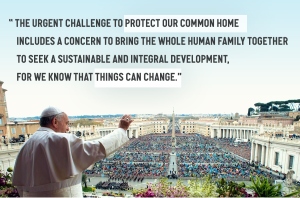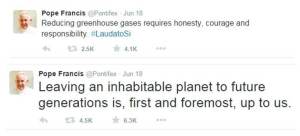With the Pope’s recent encyclical, global conversation turns to morality and climate change
In recognition of the papal encyclical on climate change released this week, we’re starting a blog series on climate and its impacts on creation. Our first post is from CFE/Save the Sound media coordinator Sarah Ganong.

We talk a lot at CFE/Save the Sound about our moral imperative to protect Long Island Sound and the lands that filter our water and clean our air. And with the recent encyclical, or papal letter, from Pope Francis imploring the 1.2 billion Catholics worldwide to take action on climate change, a new light has been shone onto the moral necessity of addressing climate change, too.
In a historic encyclical entitled Laudato Si (Praise be to you): On Caring for our Common Home officially released on June 18, Pope Francis wrote, “Climate change is a global problem with grave implications: environmental, social, economic, political and for the distribution of goods. It represents one of the principal challenges facing humanity in our day.” The document particularly emphasizes the disproportionate impact of climate change on the poor. Encyclicals are designed as letters to Church leadership and members to discuss a particular area of Catholic Social Teaching the Pope has indicated as a priority.
One of the most widely-anticipated encyclical in years is likely to continue to enliven debate in the U.S. over climate change, particularly in Congress, where many leading politicians still balk at the idea that humans are responsible for climate change. It will also likely influence global climate talks in Paris this December, as the Catholic Church inserts itself as a major moral voice on the issue of climate change.
But moral arguments for addressing climate change come from arenas beyond the Catholic Church, as well. They range from other world religions, to ethical frameworks like a focus on intergenerational justice. It’s important to protect the environment for reasons that directly benefit us, like clean drinking water, and for the wildlife that it shelters. But the environment has inherent value, too. Although moral arguments are a bit of a departure from our typical emphasis on science and the law, protecting the environment for moral reasons is the right thing to do. Here are just a few of those reasons.
Religious traditions
Among the many faiths that teach the need for stewardship of the environment, Buddhism and Judaism have especially strong traditions of environmental concern.
Judaism’s creation account, set forth in the book of Genesis, describes an on-going process of creation in which humans are just one part. As Rabbi Daniel B. Fink writes on the website for the Yale Center for Religion and Ecology, “once a week then [referring to the Sabbath, or day of rest], we are called upon to refrain from all labor that employs the things of nature for the achievement of human ends. The Sabbath is a tangible reminder that the creation is worth more than any monetary considerations…The Jewish injunction known as bal tashchit teaches us to live lightly, conserving Earth’s abundance.”
Although significant differences exist among traditions, Buddhism typically emphasizes that all sentient beings share fundamental conditions: birth, old age, suffering, and death. Environmentalists in the Buddhist tradition extend compassion beyond humans to encompass animals, plants, and the planet. And despite the connections between all forms of sentient life as understood in the doctrines of karma and rebirth, human agency must play an important role in protecting the environment and reversing the damage we have caused.
Intergenerational justice
By contributing climate change, we’re causing problems for people that who aren’t even born yet, and locking future generations into a certain level of warming that they’ll have to address. Most people want to leave the world in better shape for those who come after us. This concept of justice and fairness is a moral argument that resonates deeply with many climate activists, particularly parents and grandparents.
Environmental justice
Along with harming those who don’t yet exist, climate change also disproportionately impacts those least responsible, both geographically and in terms of those who emit the least amount of greenhouse gases—the developing world is hit hardest. Climate change also disproportionately impacts people of color, both in the U.S. and around the world.
The rights of other living things
Another moral imperative to fight climate change is protecting the right of other living beings, besides humans, to enjoy a healthy life. Climate change is affecting seasonal changes, distributions of species, breeding patterns, and countless other parts of the natural world beyond the climate system itself. Many species are harmed and even going extinct due to human-caused climate change.

Conclusion
The environment provides us with clean drinking water, clean air, and much more. But there are reasons to protect the environment far beyond the merely practical. Why do you care about protecting planet Earth and fighting climate change? What are your views of this huge news from the Catholic Church? Share your reactions in the comments, or let us know on social media. We’re on Facebook, Twitter, and Instagram.
Posted by Sarah Ganong, media coordinator at CFE/Save the Sound.
